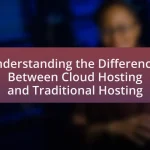Shared hosting and VPS hosting are two distinct types of web hosting services that cater to different user needs. Shared hosting allows multiple websites to share a single server’s resources, making it a cost-effective option for small sites with low traffic, but it comes with limitations in performance and customization. In contrast, VPS hosting offers dedicated resources and greater control, making it suitable for medium to large websites that require enhanced performance and scalability. This article explores the key differences between shared and VPS hosting, including resource allocation, cost implications, and ideal use cases, helping users make informed decisions based on their specific requirements.
What are Shared Hosting and VPS Hosting?
Shared hosting is a web hosting service where multiple websites are hosted on a single server, sharing its resources such as CPU, RAM, and disk space. This type of hosting is cost-effective and suitable for small websites or blogs with low traffic, as it allows users to benefit from lower prices due to resource sharing.
VPS hosting, or Virtual Private Server hosting, provides a more robust solution by partitioning a physical server into multiple virtual servers, each with dedicated resources. This setup offers greater control, flexibility, and performance compared to shared hosting, making it ideal for medium to large websites that require more power and stability.
The distinction between the two is significant: shared hosting is economical but limited in performance and customization, while VPS hosting offers enhanced capabilities at a higher cost, catering to users with growing demands.
How do Shared Hosting and VPS Hosting differ in terms of resources?
Shared hosting and VPS hosting differ significantly in terms of resources allocated to each user. In shared hosting, multiple websites share the same server resources, such as CPU, RAM, and disk space, leading to potential performance issues during high traffic periods. Conversely, VPS hosting provides dedicated resources for each virtual server, allowing for better performance, stability, and control, as users have a guaranteed portion of the server’s resources. This distinction is crucial for users with varying needs; for instance, VPS hosting can handle higher traffic and resource-intensive applications more effectively than shared hosting.
What resources are allocated in Shared Hosting?
In shared hosting, resources such as CPU, RAM, disk space, and bandwidth are allocated among multiple users on a single server. Each user shares the server’s total resources, which can lead to limitations in performance and speed, especially during peak usage times. For instance, a typical shared hosting plan may offer 1 GB of RAM and 10 GB of disk space, but these resources are not dedicated to any single user, meaning that if one website experiences high traffic, it can affect the performance of others on the same server.
How are resources managed in VPS Hosting?
Resources in VPS hosting are managed through virtualization technology, which allocates dedicated portions of physical server resources to each virtual private server. This means that each VPS operates independently with its own operating system, CPU, RAM, and storage, ensuring that resource usage is isolated from other VPS instances on the same physical server. This isolation allows for predictable performance and resource allocation, as each VPS can utilize its assigned resources without interference from others. Additionally, VPS hosting often includes management tools that allow users to monitor and adjust their resource usage, providing flexibility and control over their hosting environment.
What are the key features of Shared Hosting?
The key features of Shared Hosting include cost-effectiveness, resource sharing, ease of use, and limited customization. Shared Hosting allows multiple websites to be hosted on a single server, which significantly reduces costs for users. This model means that resources such as CPU, RAM, and bandwidth are shared among all websites on the server, making it an economical choice for small businesses and personal websites. Additionally, Shared Hosting typically offers user-friendly interfaces and one-click installations, making it accessible for users with limited technical skills. However, the shared nature of the hosting environment limits the level of customization and control compared to other hosting options, such as VPS Hosting.
What are the advantages of using Shared Hosting?
Shared hosting offers cost-effectiveness, making it an ideal choice for individuals and small businesses with limited budgets. This hosting type allows multiple users to share a single server’s resources, significantly reducing the overall cost of web hosting services. According to a report by HostingAdvice, shared hosting plans can start as low as $2.75 per month, which is substantially cheaper than dedicated or VPS hosting options. Additionally, shared hosting typically includes user-friendly features such as one-click installations and customer support, which simplify website management for users without technical expertise. These advantages make shared hosting a popular choice for beginners and those looking to establish an online presence affordably.
What limitations should users be aware of in Shared Hosting?
Users should be aware that shared hosting has several limitations, including resource constraints, performance issues, and security vulnerabilities. In shared hosting, multiple websites share the same server resources, which can lead to slower loading times and reduced performance during peak traffic periods. Additionally, the shared environment increases the risk of security breaches, as vulnerabilities in one site can potentially affect others on the same server. Furthermore, users often have limited control over server configurations and software installations, restricting customization options. These factors collectively impact the overall reliability and scalability of shared hosting solutions.
What are the key features of VPS Hosting?
The key features of VPS Hosting include dedicated resources, enhanced performance, root access, and improved security. VPS Hosting allocates specific amounts of CPU, RAM, and storage to each virtual server, ensuring that users experience consistent performance without interference from others, unlike shared hosting. Additionally, users have root access, allowing them to install and configure software as needed, which is not possible in shared environments. Security is also heightened in VPS Hosting, as each virtual server operates independently, reducing the risk of vulnerabilities affecting other users. These features collectively provide a more robust and customizable hosting solution suitable for businesses and developers requiring greater control and reliability.
How does VPS Hosting provide more control and flexibility?
VPS Hosting provides more control and flexibility by allowing users to have dedicated resources and root access to their virtual server environment. This means that users can install custom software, configure server settings, and manage security protocols according to their specific needs, unlike shared hosting where resources and configurations are limited and shared among multiple users. Additionally, VPS Hosting enables users to scale resources easily, such as CPU and RAM, to accommodate changing demands, which is not possible in shared hosting environments where resource allocation is fixed.
What are the potential drawbacks of VPS Hosting?
The potential drawbacks of VPS hosting include higher costs, the need for technical expertise, and resource limitations. VPS hosting typically incurs greater expenses compared to shared hosting, as users pay for dedicated resources and increased performance. Additionally, managing a VPS often requires a certain level of technical knowledge, which can be a barrier for those without IT experience. Furthermore, while VPS offers more resources than shared hosting, it still has limitations based on the allocated virtual environment, which may not suffice for high-traffic websites or resource-intensive applications.
What are the cost implications of Shared Hosting versus VPS Hosting?
Shared hosting is generally more cost-effective than VPS hosting, with prices typically ranging from $2 to $10 per month, while VPS hosting costs usually start around $20 and can exceed $100 per month. The lower cost of shared hosting is due to multiple users sharing the same server resources, which reduces overhead for the hosting provider. In contrast, VPS hosting allocates dedicated resources to each user, resulting in higher operational costs that are passed on to the customer. This pricing structure reflects the level of performance, control, and security offered by each hosting type, with VPS providing a more robust solution suitable for websites with higher traffic or specific resource needs.
How do the pricing models compare between Shared and VPS Hosting?
Shared hosting typically offers lower pricing compared to VPS hosting. Shared hosting plans can range from $2 to $10 per month, as multiple users share the same server resources, which reduces costs. In contrast, VPS hosting generally starts around $20 per month and can go up to $100 or more, as it provides dedicated resources and greater control over the server environment. This price difference reflects the level of performance, security, and customization available in VPS hosting compared to the more limited options in shared hosting.
What factors influence the cost of Shared Hosting?
The cost of shared hosting is influenced by several key factors, including server resources, customer support, uptime guarantees, and additional features. Server resources, such as disk space and bandwidth, directly affect pricing; plans with higher limits typically cost more. Customer support quality also impacts cost, as providers offering 24/7 support or specialized assistance may charge higher fees. Uptime guarantees, which ensure website availability, can lead to increased costs for more reliable services. Lastly, additional features like domain registration, SSL certificates, and website builders can further influence the overall price of shared hosting plans.
What factors influence the cost of VPS Hosting?
The cost of VPS hosting is influenced by several key factors, including resource allocation, server management, and provider reputation. Resource allocation refers to the amount of CPU, RAM, and storage assigned to the VPS, with higher allocations typically resulting in increased costs. Server management options, such as managed versus unmanaged services, also affect pricing; managed services generally cost more due to the additional support provided. Lastly, the reputation and reliability of the hosting provider can impact pricing, as established providers may charge a premium for their services based on their track record of performance and customer support.
What are the long-term financial considerations for each hosting type?
The long-term financial considerations for shared hosting include lower initial costs but potential for increased expenses as traffic grows, while VPS hosting entails higher upfront costs but offers scalability and dedicated resources that can lead to cost efficiency over time. Shared hosting typically charges a lower monthly fee, often around $3 to $10, making it attractive for startups; however, as a website’s traffic increases, the need for upgrades or migration to a more robust solution can incur additional costs. In contrast, VPS hosting usually starts at $20 to $100 per month, providing dedicated resources that can handle higher traffic without the need for frequent upgrades, ultimately leading to better performance and potentially lower costs in the long run due to reduced downtime and improved user experience.
How can Shared Hosting impact future scalability costs?
Shared hosting can significantly increase future scalability costs due to its limited resources and shared environment. When a website experiences growth, the constraints of shared hosting—such as bandwidth, storage, and processing power—can lead to performance issues, necessitating an upgrade to a more expensive hosting solution like VPS or dedicated hosting. According to a study by HostingAdvice, 70% of businesses that start on shared hosting face challenges in scaling their operations effectively, often resulting in unexpected costs associated with migration and downtime. This indicates that while shared hosting may be cost-effective initially, it can lead to higher long-term expenses as businesses grow and require more robust hosting solutions.
What are the potential savings or expenses associated with VPS Hosting?
VPS hosting can lead to potential savings and expenses that vary based on usage and requirements. The primary savings come from the ability to scale resources according to demand, which can reduce costs compared to dedicated servers. For instance, VPS plans typically range from $20 to $100 per month, while dedicated servers can start at $100 and go much higher, making VPS a more economical choice for many businesses.
On the expense side, VPS hosting may incur additional costs for managed services, security features, and backups, which can add $50 to $200 monthly depending on the provider and level of service. Additionally, if a business requires high uptime and performance, it may need to invest in higher-tier VPS plans, leading to increased expenses.
Overall, while VPS hosting offers cost-effective scalability, businesses must consider the potential for added expenses based on their specific needs and service choices.
What are the use cases for Shared Hosting and VPS Hosting?
Shared hosting is ideal for small websites, blogs, and startups due to its cost-effectiveness and ease of use, while VPS hosting is suited for medium to large businesses that require more control, resources, and scalability. Shared hosting allows multiple users to share a single server, making it affordable for low-traffic sites, whereas VPS hosting provides dedicated resources and greater customization options, catering to websites with higher traffic and specific performance needs.
What types of websites are best suited for Shared Hosting?
Websites that are best suited for shared hosting include small business sites, personal blogs, and informational websites. These types of websites typically have lower traffic volumes and do not require extensive resources, making shared hosting a cost-effective solution. Shared hosting allows multiple websites to share the same server resources, which is ideal for users who do not need dedicated server capabilities. According to a study by HostingAdvice, over 70% of small websites utilize shared hosting due to its affordability and ease of use, confirming its suitability for low-traffic sites.
How does Shared Hosting benefit small businesses or personal sites?
Shared hosting benefits small businesses and personal sites by providing an affordable and user-friendly solution for website management. This type of hosting allows multiple websites to share a single server’s resources, significantly reducing costs, which is crucial for small businesses operating on tight budgets. According to a report by HostingAdvice, shared hosting plans can start as low as $2.75 per month, making it accessible for startups and individual users. Additionally, shared hosting typically includes easy-to-use control panels and one-click installation options for popular applications, simplifying the process for users with limited technical expertise. This combination of low cost and ease of use makes shared hosting an ideal choice for small businesses and personal sites looking to establish an online presence without significant financial investment.
What are the performance expectations for Shared Hosting users?
Performance expectations for Shared Hosting users typically include limited resources, slower load times, and potential downtime due to resource sharing among multiple users. Shared Hosting environments allocate a portion of server resources, such as CPU and RAM, to each user, which can lead to performance degradation during peak usage times. According to a study by HostingAdvice, shared hosting can result in average load times of 1-3 seconds, depending on the server load and the number of websites hosted on the same server. Additionally, users may experience slower response times and reduced reliability compared to dedicated or VPS hosting solutions, where resources are not shared.
What types of websites are best suited for VPS Hosting?
Websites that require dedicated resources, enhanced performance, and greater control are best suited for VPS hosting. This includes e-commerce sites, high-traffic blogs, and applications that demand specific software configurations. VPS hosting provides the necessary scalability and reliability for these types of websites, allowing them to handle increased traffic and resource-intensive tasks without the limitations often found in shared hosting environments. For instance, e-commerce platforms benefit from VPS hosting due to the need for secure transactions and fast loading times, which are critical for user experience and conversion rates.
How does VPS Hosting cater to growing businesses or high-traffic sites?
VPS Hosting caters to growing businesses or high-traffic sites by providing dedicated resources and enhanced performance compared to shared hosting. This type of hosting allocates specific amounts of CPU, RAM, and storage to each virtual server, ensuring that high traffic does not lead to slowdowns or downtime. For instance, a VPS can handle increased visitor loads effectively, as it allows for scalability; businesses can upgrade their resources as needed without migrating to a new server. Additionally, VPS Hosting offers greater control and customization, enabling businesses to configure their server environment to meet specific application requirements, which is crucial for optimizing performance and security.
What specific features make VPS Hosting ideal for developers or tech-savvy users?
VPS Hosting is ideal for developers and tech-savvy users due to its dedicated resources, full root access, and customizable environments. Dedicated resources ensure that users have guaranteed CPU, RAM, and storage, which enhances performance and reliability compared to shared hosting. Full root access allows developers to install and configure software, manage security settings, and optimize server performance according to their specific needs. Additionally, customizable environments enable users to choose their operating system and software stack, facilitating the development and testing of applications in a controlled setting. These features collectively empower developers to create, deploy, and manage applications more effectively.
What are the best practices for choosing between Shared and VPS Hosting?
The best practices for choosing between Shared and VPS Hosting involve assessing your website’s traffic, resource requirements, and budget. Shared Hosting is suitable for small websites with low traffic and limited resource needs, as it is cost-effective and easy to manage. In contrast, VPS Hosting is ideal for medium to large websites that require more control, dedicated resources, and better performance, especially during traffic spikes.
Additionally, consider the level of technical expertise available; VPS Hosting often requires more management skills. According to a study by HostingAdvice, 70% of users reported improved performance and reliability with VPS compared to Shared Hosting, reinforcing the importance of matching hosting type to specific needs.
How can users assess their hosting needs effectively?
Users can assess their hosting needs effectively by evaluating their website’s traffic, resource requirements, and growth expectations. Analyzing current and projected visitor numbers helps determine whether shared hosting, which is cost-effective for low traffic, or VPS hosting, which offers dedicated resources for higher traffic, is more suitable. Additionally, users should consider the types of applications they plan to run; for instance, resource-intensive applications may necessitate VPS hosting. According to a study by HostingAdvice, 70% of users reported that understanding their website’s needs led to better hosting decisions, highlighting the importance of this assessment process.
What common mistakes should users avoid when selecting a hosting type?
Users should avoid the mistake of not assessing their specific needs when selecting a hosting type. Many individuals choose shared hosting for its low cost without considering potential limitations, such as performance issues and lack of control, which can hinder website growth. Additionally, users often overlook scalability; selecting a hosting type that cannot accommodate future traffic increases can lead to significant downtime or migration challenges. Another common error is ignoring the importance of customer support; inadequate support can exacerbate issues during critical times. Lastly, users frequently fail to evaluate security features, which are essential for protecting sensitive data, especially in shared hosting environments where resources are shared among multiple users.










